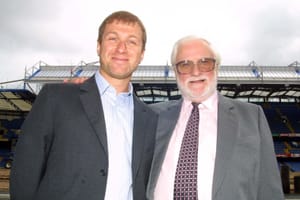On July 1, 2003, a seismic shift occurred in the world of football when Ken Bates, the outspoken and controversial chairman of Chelsea Football Club, agreed to sell the club to Russian billionaire Roman Abramovich for £140 million. This transaction not only transformed Chelsea but also reshaped the landscape of English and European football, ushering in an era of unprecedented financial investment and ambition in the sport.
On This Day in 2003, Ken Bates agreed to sell Chelsea Football Club to Roman Abramovich for around £140m.
— CFC-Blues (@CFCBlues_com) June 30, 2025
The rest as they say, is history:
🏆🏆🏆🏆🏆 FA Cup
🏆🏆🏆🏆🏆 Premier League
🏆🏆🏆 League Cup
🏆🏆 Europa League
🏆🏆 Champions League
🏆 Super Cup
🏆 Club World Cup pic.twitter.com/J5hur0ve6P
The Sale: A Deal Born of Necessity
By the early 2000s, Chelsea FC was a club with a proud history but a precarious financial situation. Under Ken Bates’ stewardship since 1982, Chelsea had risen from the Second Division to become a competitive force in the Premier League, winning the FA Cup in 1997 and 2000, and the UEFA Cup Winners’ Cup in 1998. However, the club’s ambitions came at a cost. Bates had overseen the development of Stamford Bridge and invested heavily in the squad, but by 2003, Chelsea was burdened with debts reportedly exceeding £80 million. The club’s financial woes made it vulnerable, and Bates, known for his shrewd business acumen, recognized the need for a saviour.
Enter Roman Abramovich, a then-36-year-old Russian oligarch who had amassed a fortune through oil and other industries during Russia’s post-Soviet privatization era. Relatively unknown in football circles, Abramovich’s interest in the sport was sparked during a visit to a Manchester United match, but it was Chelsea—based in affluent West London and ripe for transformation—that caught his eye. On July 1, 2003, after weeks of negotiations, Bates agreed to sell his controlling stake in Chelsea FC to Abramovich, who paid £60 million for the club and assumed its debts, totaling £140 million. The deal was finalized swiftly, marking the beginning of a new era for the Blues.
The Immediate Impact
Abramovich’s arrival sent shockwaves through football. Unlike previous owners who operated within relatively modest budgets, Abramovich brought unparalleled financial firepower. His first act was to provide manager Claudio Ranieri with a war chest to bolster the squad. In the summer of 2003, Chelsea spent over £100 million on players, including stars like Claude Makélélé, Damien Duff, and Hernán Crespo. This spending spree signalled a new era of ambition, with Chelsea no longer content to be a mid-tier Premier League side.
The 2003-04 season saw Chelsea finish second in the Premier League and reach the UEFA Champions League semi-finals, laying the foundation for future success. However, it was the appointment of José Mourinho in 2004 that truly ignited Chelsea’s dominance. Backed by Abramovich’s wealth, Mourinho led Chelsea to their first league title in 50 years in 2005, followed by another in 2006. The club’s trophy cabinet began to fill rapidly, with FA Cups, League Cups, and Community Shields following in quick succession.
Roman Abramovich’s Legacy: Triumphs and Controversies
Over the next two decades, Roman Abramovich’s ownership transformed Chelsea into one of the world’s most successful and recognizable football clubs. His financial backing and relentless pursuit of excellence yielded an extraordinary haul of silverware:
- Premier League Titles: 5 (2004-05, 2005-06, 2009-10, 2014-15, 2016-17)
- UEFA Champions League: 2 (2012, 2021)
- UEFA Europa League: 2 (2013, 2019)
- FA Cups: 5
- League Cups: 3
- FIFA Club World Cup: 1 (2021)
- UEFA Super Cup: 2
Chelsea’s 2012 Champions League triumph, secured in a dramatic penalty shootout against Bayern Munich, remains a pinnacle of Abramovich’s tenure, fulfilling his long-standing ambition to conquer Europe. The 2021 Champions League victory under Thomas Tuchel further cemented Chelsea’s status as a European powerhouse.
Beyond trophies, Abramovich revolutionized Chelsea’s infrastructure. Stamford Bridge was modernized, the Cobham training facility became world-class, and the club’s academy and women’s team flourished, with the latter dominating English women’s football. His investment also elevated Chelsea’s global brand, attracting fans worldwide and turning the club into a commercial juggernaut.
However, Abramovich’s tenure was not without controversy. His vast wealth and links to Russian politics drew scrutiny, particularly in later years. The revolving door of managers—16 in 19 years, including fan favourites like Mourinho and Carlo Ancelotti—frustrated supporters, despite the success. Critics also argued that Chelsea’s “moneyball” approach, fueled by Abramovich’s billions, distorted the transfer market and set a precedent for state-backed ownership models, as seen later with Manchester City and Paris Saint-Germain.
The End of an Era
Abramovich’s ownership came to an abrupt end in 2022 amid geopolitical tensions. Following Russia’s invasion of Ukraine, the UK government imposed sanctions on Abramovich due to his alleged ties to the Russian state. Forced to sell the club, he oversaw its transfer to a consortium led by American businessman Todd Boehly for £4.25 billion in May 2022. Despite the contentious exit, Abramovich waived any repayment of the £1.5 billion in loans he had provided to Chelsea, ensuring the club’s financial stability.
A Lasting Legacy
Roman Abramovich’s purchase of Chelsea on July 1, 2003, marked a watershed moment in football history. His wealth and vision transformed a struggling club into a global giant, redefining what success meant in the modern game. While his methods sparked debate, the trophies, infrastructure, and global fanbase he left behind are undeniable. Chelsea’s story under Abramovich is one of ambition, triumph, and transformation—a legacy that continues to shape the club and the sport as a whole.





